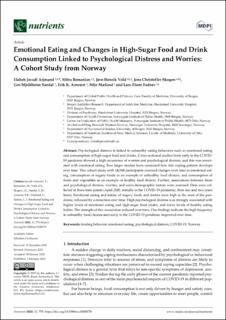| dc.contributor.author | Javadi Arjmand, Elaheh | |
| dc.contributor.author | Bemanian, Mitra | |
| dc.contributor.author | Vold, Jørn Henrik | |
| dc.contributor.author | Skogen, Jens Christoffer | |
| dc.contributor.author | Sandal, Gro Mjeldheim | |
| dc.contributor.author | Arnesen, Erik Kristoffer | |
| dc.contributor.author | Mæland, Silje | |
| dc.contributor.author | Fadnes, Lars T. | |
| dc.date.accessioned | 2023-04-03T07:55:15Z | |
| dc.date.available | 2023-04-03T07:55:15Z | |
| dc.date.created | 2023-02-19T10:24:51Z | |
| dc.date.issued | 2023 | |
| dc.identifier.issn | 2072-6643 | |
| dc.identifier.uri | https://hdl.handle.net/11250/3061657 | |
| dc.description.abstract | Psychological distress is linked to unhealthy eating behaviors such as emotional eating and consumption of high-sugar food and drinks. Cross-sectional studies from early in the COVID-19 pandemic showed a high occurrence of worries and psychological distress, and this was associated with emotional eating. Few larger studies have examined how this coping pattern develops over time. This cohort study with 24,968 participants assessed changes over time in emotional eating, consumption of sugary foods as an example of unhealthy food choices, and consumption of fruits and vegetables as an example of healthy food choices. Further, associations between these and psychological distress, worries, and socio-demographic factors were assessed. Data were collected at three time points (April 2020, initially in the COVID-19 pandemic, then one and two years later). Emotional eating and intake of sugary foods and drinks were high at the start of the pandemic, followed by a reduction over time. High psychological distress was strongly associated with higher levels of emotional eating and high-sugar food intake, and lower levels of healthy eating habits. The strength of this association reduced over time. Our findings indicate the high frequency in unhealthy food choices seen early in the COVID-19 pandemic improved over time. | en_US |
| dc.language.iso | eng | en_US |
| dc.publisher | MDPI | en_US |
| dc.relation.uri | https://www.mdpi.com/2072-6643/15/3/778 | |
| dc.rights | Navngivelse 4.0 Internasjonal | * |
| dc.rights.uri | http://creativecommons.org/licenses/by/4.0/deed.no | * |
| dc.title | Emotional Eating and Changes in High-Sugar Food and Drink Consumption Linked to Psychological Distress and Worries: A Cohort Study from Norway | en_US |
| dc.type | Journal article | en_US |
| dc.type | Peer reviewed | en_US |
| dc.description.version | publishedVersion | en_US |
| dc.rights.holder | Copyright 2023 The Author(s) | en_US |
| dc.source.articlenumber | 778 | en_US |
| cristin.ispublished | true | |
| cristin.fulltext | original | |
| cristin.qualitycode | 1 | |
| dc.identifier.doi | 10.3390/nu15030778 | |
| dc.identifier.cristin | 2127273 | |
| dc.source.journal | Nutrients | en_US |
| dc.identifier.citation | Nutrients. 2023, 15 (3), 778. | en_US |
| dc.source.volume | 15 | en_US |
| dc.source.issue | 3 | en_US |

